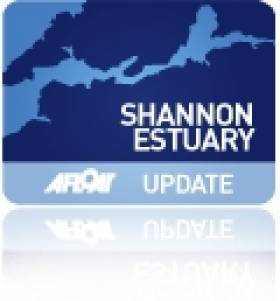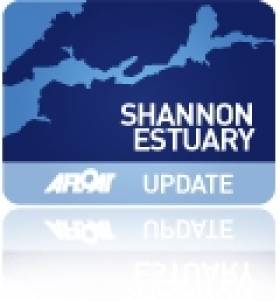Displaying items by tag: Mermaid
Zuleika Dominates Second Race of Mermaid Week
Yesterday (Monday), Foynes lived up to it's reputation as being a tricky place in which to sail. A strong ebbing tide and shifty 8-10 knot breeze dominated racing in the 33 strong Mermaid fleet in Race 2 of the National Championship.
Race Officer, Liam Dineen, conscious of the effect of the tide sweeping across the start line opted to fly flag I instead of P at 4 minutes before start. This meant that any boats over the line in the last minute, had to go around either end of the start line before starting. The tide swept some boats over, and an individual recall was sounded, but no boats came back to restart.
Five times champion Derek Joyce in 187 Zuleika totally dominated the race, leading all the way and crossing the finish line in first place, to the sound of silence – he scored OCS as he was one of six boats over the line. Shay O'Toole's 182 Dolphin crossed one minute later and scored a first place, with Jim Dempsey in 183 Wannago in third place. Next to cross the line was Ross Galbraith in 185 The Message, but he also scored OCS. Wild Wind 131 (Paddy Dillon) was third, Vee 123 (Jim Carthy) was fourth. Enda Weldon in 186 MyDi crossed next but scored OCS, giving fifth place to Anthony Carthy in 188 Innocence. In the beats today it generally paid to go right, thus getting into the channel and riding the 1.9knot ebbing tide. There was a lot of place swapping on the last beat as the wind shifted NW, punishing those on the lay line.
This now leaves the championship wide open. One discard will apply once five races have been sailed and this leaves Championship contender Joyce with a hill to climb.
Overall placing after two races: 1st 183 Wannago (Dempsey) 4 points, 2nd 123 Vee (J Carthy) 5 points, 3rd 131 Wild Wind (Dillon), 7 points, 4th 188 Innocence (A Carthy) 10 points, 5th 135 Cara II (F Browne) 11 points. Today's winner, 182 Dolphin (S O'Toole) is 6th overall on equal points with 7th place 134 Jill (Smith). The remainder of the top 10 are 177 This is It, 73 Lively Lady and 77 Tiller Girl. Joyce is 18th with 40 points and is waiting for that discard to apply.
In the Daphne fleet (equivalent of Silver fleet), Geraldine O'Neill in 73 Lively Lady leads at 4 points, Paddy Boardman in 26 Thumbalina and Martin O'Toole in 179 Bean Adhmaid are next with 7 points each. In the Designer fleet (equivalent of Bronze), the leader is Mark Boylan in 177 This Is It with two wins, followed by Mark McCormack in 54 Hycilla and Paddy Archer in 18 Clare.
The first Mermaid was built in 1932 and new boats are currently under construction this year. The average age of the thirty three boats racing this week is 42.2 years.
Racing continues today, Tuesday, at 15:00, followed by the Crew Race at approximately 17:30. A Live Commentary is streamed on the web at www.dublinbaymermaid.org/foynes2010 (click on Commentary), and yesterday's commentary was viewed 435 by Mermaiders, retired sailors, family and friends all over the world. Today's Live Commentary will start at 14:30 and will continue till the end of the Crew Race at about 19:15.
Mermaid Week Starts with Fresh Conditions in Foynes
Local boat 46 Argo sailed by Darragh McCormack, Donal Moroney and Luke Murray were a convincing fourth and are showing a turn of speed, rewarding their practice in the past few months and work on the boat last winter. The 2009 champion 131 Wild Wind sailed by Paddy Dillon of Rush, retired early in the race.
There were three capsizes and some minor gear damage as the squalls came through past Foynes Island. Principal Race Officer Liam Dineen of Skerries set up a balanced course, with boats going up both sides of the beat, a slightly tight first reach and a square run.
The real racing starts tomorrow with Race 1 at 14:00.
Catch up with the latest Mermaid Week news and live updates during racing at www.dublinbaymermaid.org/foynes2010
Mermaid Sailing Association
The Dublin Bay Mermaid class was designed by JB Kearney in 1932 and still going strong today. From the oldest Amy (No. 1) to the youngest Azeezy (No. 189), this 17ft clinker built wooden dinghy provides challenging and exciting sailing for three person crews in all weathers. Click here for the latest Mermaid news and updates.
Mermaids can be found in Dun Laoghaire, Clontarf, Skerries, Rush, Wexford, Foynes and Sligo.
Mermaid Sailing Association, c/o Paddy Archer, President, Sandy Lane, Rush, Co Dublin. Tel: 01 843 7089
or
R. Galbraith, Hon. Sec., email: [email protected]
or, if you have any photos or other material for the Mermaid website, contact Peter Scallan at [email protected]
(Above details courtesy of Mermaid Sailing Association)
Graham Smith, in Afloat's March 2009 issue, wrote: "Not too many new Mermaids are built these days but while the class might be categorised under the heading ‘static’, with 189 boats on the register, it’s a very healthy static!
Although turnouts at regional events only manage the mid-teens, the National Championships generally sees a big effort from all the Mermaid clubs. Last year even saw an increase on 2007, possibly because Rush in north county Dublin is more convenient for more sailors than Tralee the previous year. Niall McGrotty of Skerries, who won that championship for the first time, retained his title from 33 other Mermaid crews.
On the regional front, Jonathan O’Rourke of NYC won the Southerns in Foynes and Wexford’s Derek Joyce took the Easterns at Skerries. National Champion: Niall McGrotty, Skerries SC."
There is a space for Irish boating clubs and racing classes to use as their own bulletin board and forum for announcements and discussion. If you want to see a dedicated forum slot for your club or class, click here






























































